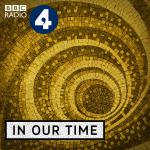
Episode summary: Melvyn Bragg and guests discuss solar eclipses, some of life’s most extraordinary moments, when day becomes night and the stars come out before day returns either all too soon or not soon enough, depending on what you understand to be happening. In ancient China, for example, there was a story that a dragon was eating the sun and it had to be scared away by banging pots and pans if the sun were to return. Total lunar eclipses are more frequent and last longer, with a blood moon coloured red like a sunrise or sunset. Both events have created the chance for scientists to learn something remarkable, from the speed of light, to the width of the Atlantic, to the roundness of Earth, to discovering helium and proving Einstein’s Theory of General Relativity. With Carolin Crawford Public Astronomer based at the Institute of Astronomy, University of Cambridge and a fellow of Emmanuel College Frank Close Emeritus Professor of Physics at the University of Oxford And Lucie Green Professor of Physics and a Royal Society…
Webmentions
Webmentions allow conversations across the web, based on a web standard. They are a powerful building block for the decentralized social web.
If you write something on your own site that links to this post, you can send me a Webmention by putting your post's URL in here:
Webmentions